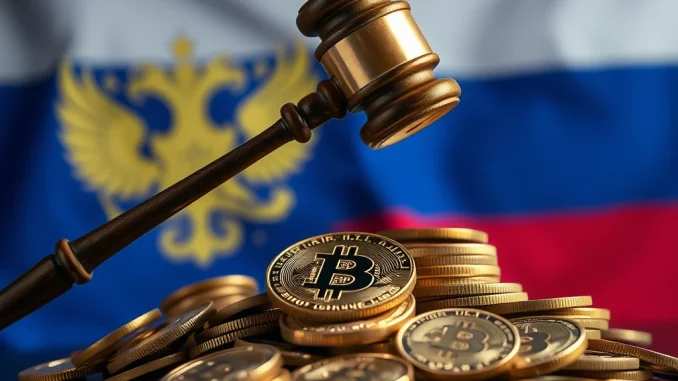
In a fascinating turn of events in the world of cryptocurrency and government finance, Russia is pioneering a novel approach to boost its state coffers. Imagine a scenario where assets confiscated from criminal activities aren’t just traditional cash or goods, but rather, digital gold – Bitcoin. Yes, you heard it right! Russia is actively developing a legal pathway to sell off Bitcoin seized from criminal cases. This move, reported by CryptoSlate, signals a significant step towards integrating digital assets into state financial strategies. But how will this work, and what does it mean for the future of crypto regulation and adoption? Let’s dive deep into this intriguing development.
Why is Russia Eyeing Seized Bitcoin?
The primary driver behind this initiative is quite straightforward: government revenue. Like any nation, Russia is constantly seeking ways to bolster its financial resources. With the increasing prevalence of cryptocurrencies in financial crimes, a substantial amount of digital assets, particularly Bitcoin, are being seized in criminal investigations. Instead of letting these assets sit idle, Russia is exploring a proactive strategy to convert them into state funds. This approach presents a potentially lucrative avenue for revenue generation, especially considering the volatile yet often appreciating nature of Bitcoin.
Think of it this way:
- Untapped Asset Pool: Seized Bitcoin represents a potentially vast and currently untapped pool of assets.
- Revenue Generation: Selling this Bitcoin can directly translate into increased funds for the government.
- Modern Financial Strategy: Embracing this strategy positions Russia as a forward-thinking nation adapting to the realities of the digital economy.
The Case of the 1,032.1 Bitcoin Bribe: A Starting Point
The catalyst for this initiative seems to be a high-profile case involving a former official from an investigative committee. This official allegedly accepted a staggering bribe of 1,032.1 BTC. At today’s Bitcoin prices, this amount is substantial, underscoring the potential value locked up in seized crypto assets. This particular case is likely to serve as the initial testing ground for the new legal framework. Successfully navigating the complexities of legally seizing and liquidating these Bitcoin holdings in this case will pave the way for broader implementation.
Navigating the Legal Labyrinth of Crypto Regulation
One of the most significant hurdles in this endeavor is establishing a robust crypto regulation framework. The legal status of cryptocurrencies varies widely across jurisdictions, and even within countries, regulations are often evolving. For Russia, creating a “legal path” is crucial. This involves:
- Defining Legal Status: Clearly defining Bitcoin and other cryptocurrencies within the legal framework for asset seizure and sale.
- Establishing Procedures: Developing transparent and legally sound procedures for seizing, storing, and selling confiscated crypto.
- Compliance and Security: Ensuring compliance with anti-money laundering (AML) and counter-terrorism financing (CTF) regulations while maintaining the security of seized digital assets.
The development of this legal framework is not just about selling Bitcoin; it’s about creating a comprehensive and adaptable system for dealing with digital assets in the context of law enforcement and state finance. This could set a precedent for other nations grappling with similar challenges.
How Will Russia Sell Seized Bitcoin? Exploring the Options
The mechanics of selling seized Bitcoin are still under development, but several potential approaches exist. Each option comes with its own set of considerations:
| Method | Pros | Cons |
|---|---|---|
| Public Auctions | Transparency, potentially higher prices due to competitive bidding. | Market volatility impacting auction value, logistical complexities. |
| Over-the-Counter (OTC) Desks | Large volume sales, potentially faster liquidation. | Less transparent pricing, potential for market manipulation. |
| Crypto Exchanges | Established infrastructure, accessibility to a wide range of buyers. | Market impact from large sell orders, regulatory compliance requirements. |
It’s likely that Russia will explore a combination of these methods to optimize revenue and minimize market disruption. The choice of method will also depend on the volume of Bitcoin being sold and the prevailing market conditions.
Challenges and Considerations
While the prospect of monetizing seized Bitcoin is enticing, Russia faces several challenges in implementing this plan effectively:
- Market Volatility: The price of Bitcoin is notoriously volatile. Timing sales to maximize revenue while mitigating risk will be crucial.
- Security Risks: Storing and transferring large amounts of seized Bitcoin securely is paramount to prevent theft or loss.
- Transparency and Accountability: Ensuring transparency and accountability in the process is essential to maintain public trust and prevent corruption.
- International Scrutiny: Russia’s approach to crypto regulation and asset liquidation will likely be closely watched by international bodies and other nations.
Global Implications: Will Other Nations Follow Suit?
Russia’s initiative could have significant global implications. If successful, it could encourage other countries to adopt similar strategies for dealing with seized Bitcoin and other cryptocurrencies. This could lead to:
- Increased Government Adoption of Crypto: More governments may begin to view cryptocurrencies not just as assets to regulate, but also as potential sources of revenue.
- Standardization of Crypto Asset Seizure: A push towards international standards and best practices for seizing and managing crypto assets in criminal cases.
- Evolution of Crypto Regulation: Further development and refinement of crypto regulations globally, driven by practical applications like asset liquidation.
The Future of Crypto and State Finance: A Revolutionary Shift?
Russia’s plan to monetize seized Bitcoin is more than just a revenue-generating scheme; it represents a potentially revolutionary shift in how governments interact with cryptocurrencies. By actively integrating digital assets into its financial strategies, Russia is signaling a growing acceptance and recognition of the role of crypto in the modern economy. This initiative could pave the way for a future where digital assets are routinely incorporated into state finance, law enforcement, and economic policy.
Conclusion: A Bold Step into the Digital Asset Era
Russia’s foray into legally selling seized Bitcoin is a bold and innovative move. It highlights the increasing importance of cryptocurrencies in the global financial landscape and the need for governments to adapt and evolve their strategies accordingly. While challenges remain, the potential benefits for state revenue and the broader crypto ecosystem are substantial. As Russia navigates this uncharted territory, the world will be watching closely, eager to see if this pioneering approach will unlock a new era of crypto- государственного (crypto-state) finance. This development is certainly one to watch as it unfolds, promising to shape the future of crypto regulation and government interaction with digital assets worldwide.



